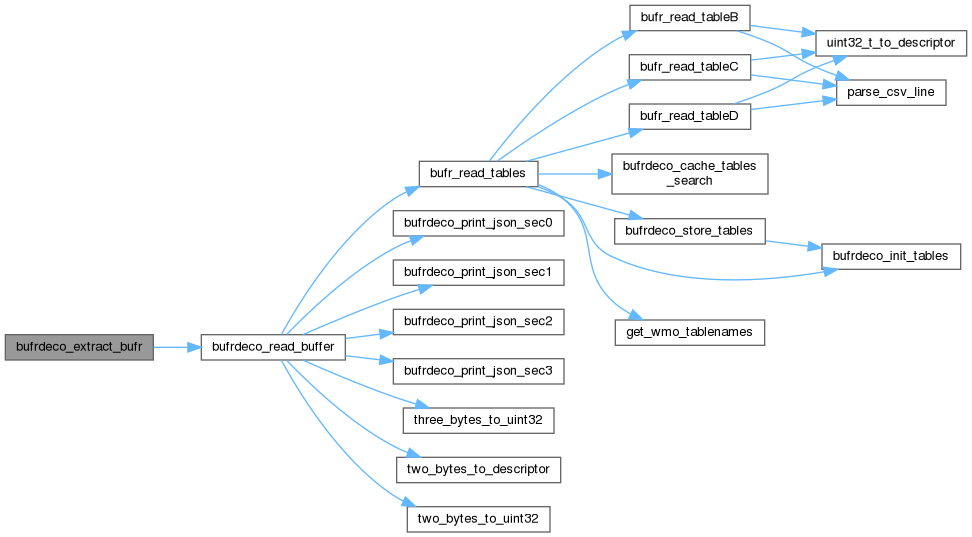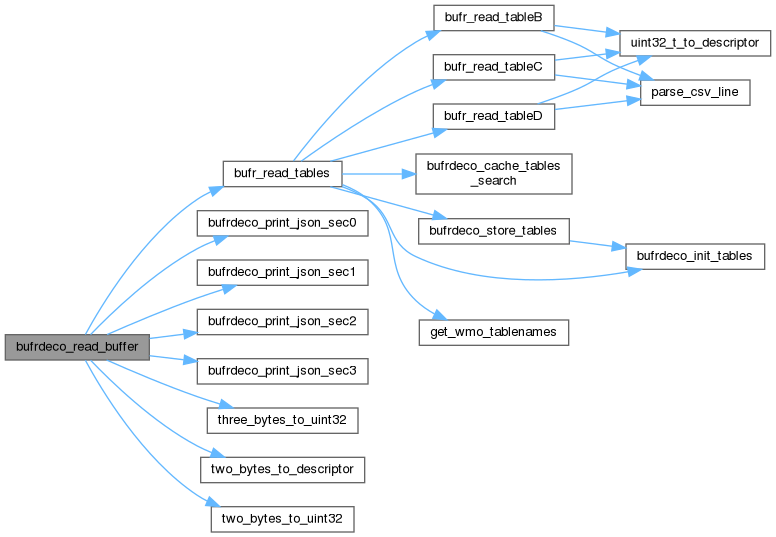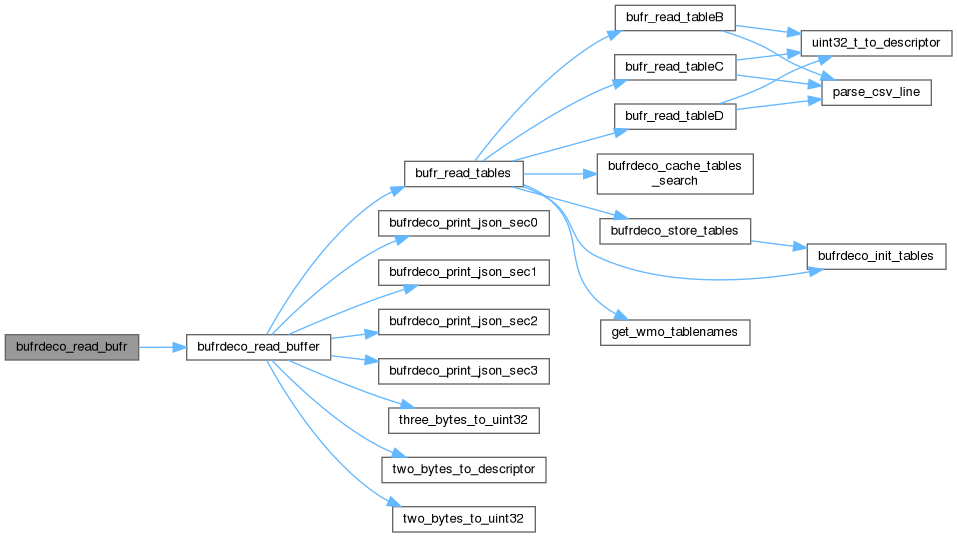This file has the code to read bufr files. More...
#include "bufrdeco.h"
Go to the source code of this file.
Functions | |
| int | bufrdeco_read_bufr (struct bufrdeco *b, char *filename) |
| Read bufr file and does preliminary and first decode pass. More... | |
| int | bufrdeco_extract_bufr (struct bufrdeco *b, char *filename) |
| Read file and try to find a bufr report inserted in. Once found do the same that bufrdeco_read_file() More... | |
| int | bufrdeco_read_buffer (struct bufrdeco *b, uint8_t *bufrx, buf_t size) |
Detailed Description
This file has the code to read bufr files.
Definition in file bufrdeco_read.c.
Function Documentation
◆ bufrdeco_extract_bufr()
| int bufrdeco_extract_bufr | ( | struct bufrdeco * | b, |
| char * | filename | ||
| ) |
Read file and try to find a bufr report inserted in. Once found do the same that bufrdeco_read_file()
- Parameters
-
b pointer to struct bufrdeco filename complete path of BUFR file
- Returns
- 0 if all is OK, 1 otherwise
This function does the folowing tasks:
- Try to find first buffer of bytes begining with 'BUFR' chars and ending with '7777'. This will be considered as a bufr file.
- Read the file and checks the marks at the begining and end to see wheter is a BUFR file
- Init the structs and allocate the needed memory if not done previously
- Splits and parse the BUFR sections (without expanding descriptors nor parsing data)
- Reads the needed Table files and store them in memory.
< pointer to a memory buffer where we write raw bufr file
Definition at line 120 of file bufrdeco_read.c.
References BUFR_LEN, bufrdeco_assert, bufrdeco_read_buffer(), and bufrdeco::error.
Referenced by bufrdeco_get_bufr(), and main().


◆ bufrdeco_read_buffer()
Definition at line 225 of file bufrdeco_read.c.
References bufr_sec4::bit_offset, BUFR_LEN, BUFR_LEN_UNEXPANDED_DESCRIPTOR, bufr_sec0::bufr_length, bufr_read_tables(), bufrdeco_assert, BUFRDECO_OUTPUT_JSON_SEC0, BUFRDECO_OUTPUT_JSON_SEC1, BUFRDECO_OUTPUT_JSON_SEC2, BUFRDECO_OUTPUT_JSON_SEC3, bufrdeco_print_json_sec0(), bufrdeco_print_json_sec1(), bufrdeco_print_json_sec2(), bufrdeco_print_json_sec3(), bufr_sec1::category, bufr_sec1::centre, bufr_sec3::compressed, bufr_sec1::day, bufr_sec0::edition, bufrdeco::error, bufr_descriptor::f, bufr_sec1::hour, bufr_sec1::length, bufr_sec2::length, bufr_sec3::length, bufr_sec4::length, bufrdeco::mask, bufr_sec1::master, bufr_sec1::master_local, bufr_sec1::master_version, bufr_sec1::minute, bufr_sec1::month, bufr_sec3::ndesc, bufr_sec3::observed, bufr_sec1::options, bufrdeco::out, bufr_sec0::raw, bufr_sec4::raw, bufr_sec1::raw, bufr_sec2::raw, bufr_sec3::raw, bufrdeco::sec0, bufrdeco::sec1, bufrdeco::sec2, bufrdeco::sec3, bufrdeco::sec4, bufr_sec1::second, bufr_sec1::subcategory, bufr_sec1::subcategory_local, bufr_sec1::subcentre, bufr_sec3::subsets, three_bytes_to_uint32(), two_bytes_to_descriptor(), two_bytes_to_uint32(), bufr_sec3::unexpanded, bufr_sec1::update, bufr_descriptor::x, bufr_descriptor::y, and bufr_sec1::year.
Referenced by bufrdeco_extract_bufr(), and bufrdeco_read_bufr().


◆ bufrdeco_read_bufr()
| int bufrdeco_read_bufr | ( | struct bufrdeco * | b, |
| char * | filename | ||
| ) |
Read bufr file and does preliminary and first decode pass.
- Parameters
-
b pointer to struct bufrdeco filename complete path of BUFR file
- Returns
- 0 if all is OK, 1 otherwise
This function does the folowing tasks:
- Read the file and checks the marks at the begining and end to see wheter is a BUFR file
- Init the structs and allocate the needed memory if not done previously
- Splits and parse the BUFR sections (without expanding descriptors nor parsing data)
- Reads the needed Table files and store them in memory.
< pointer to a memory buffer where we write raw bufr file
Definition at line 41 of file bufrdeco_read.c.
References BUFR_LEN, bufrdeco_assert, bufrdeco_read_buffer(), and bufrdeco::error.
Referenced by main().

